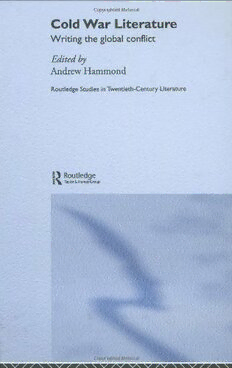
Cold War Literature Writing the Global Conflict (Routledge Studies in Twentieth-Century Literature) PDF
286 Pages·2005·2.006 MB·English
Most books are stored in the elastic cloud where traffic is expensive. For this reason, we have a limit on daily download.
Preview Cold War Literature Writing the Global Conflict (Routledge Studies in Twentieth-Century Literature)
Description:
The Cold War was the longest conflict in a century defined by the scale and brutality of its conflicts. In the battle between the democratic West and the communist East there was barely a year in which the West was not organising, fighting or financing some foreign war. It was an engagement that resulted – in Korea, Guatemala, Nicaragua and elsewhere – in some twenty million dead. This collection of essays analyses the literary response to the coups, insurgencies and invasions that took place around the globe, and explores the various thematic and stylistic trends that Cold War hostilities engendered in world writing. Drawing together scholars of various cultural backgrounds, the volume focuses upon such themes as representation, nationalism, political resistance, globalisation and ideological scepticism. Eschewing the typical focus in Cold War scholarship on Western authors and genres, there is an emphasis on the literary voices that emerged from what are often considered the ‘peripheral’ regions of Cold War geo-politics. Ranging in focus from American postmodernism to Vietnamese poetry, from Cuban autobiography to Maoist theatre, and from African fiction to Soviet propaganda, this book will be of real interest to all those working in twentieth-century literary studies, cultural studies, history and politics.
See more
The list of books you might like
Most books are stored in the elastic cloud where traffic is expensive. For this reason, we have a limit on daily download.
